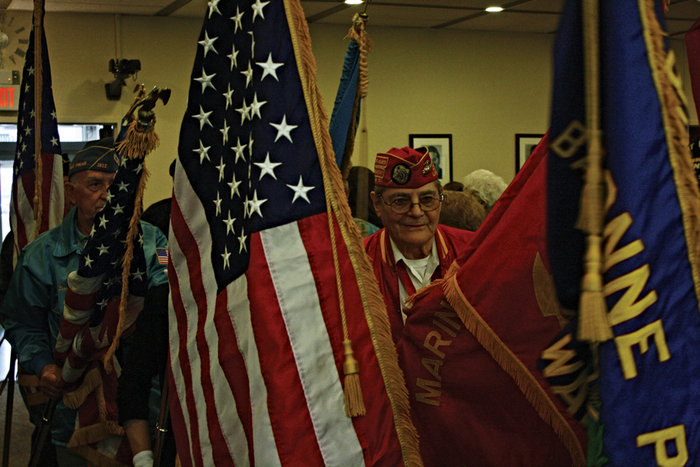“In to the left. In to the right. Eight words spoken quietly and indifferently without emotion. Eight short words. That was the moment I parted from my mother,” said Rev. Gregory Perez, quoting Eile Wiesel’s recollections of a Nazi death camp.
The passage described that moment when people—most of them Jews—were told if they were going to live or die, assigned one way to the death chambers and another to a line which could lead to a little more of life.
“Eight simple words, words we hope we’d never hear again as the human race,” Perez said. “In fact, we hope that humankind is not so divided as it was not long ago in this painful history of this world.”
Each year, the community gathers in City Hall to mark Yom Hashoah, or Holocaust Remembrance Day, which is usually held around the anniversary of the Warsaw Uprising in 1943.
The day becomes more important each year as those with memories of the Nazi atrocities pass away, and the community seeks to pass along these tales of outrage with the hope that future generations will keep it from happening again.
Of dozens that once lived in the area with memories of the horrors of that time, only four still live in Bayonne: Luba Woloski, Katie Berces, Regina Resnick, and Sally Friedman, all of whom returned this year to continue the effort to keep the memory alive.
Bayonne, according Dr. Joseph Ryan, who served as moderator for this year’s ceremony, is one of the few places where this event is held in a municipal council chambers.
Perez, who is a member of the Bayonne Interfaith Clergy, said his group promotes interfaith dialog and education, working with various civic leaders, organizations, families, and others to promote a vision where no one is to be separated and all are to be respected and welcomed. Holocaust Remembrance Day is one of a number of events that his group takes part in.
“We gather in this way to show the citizens of our community and the world that there can no longer be a time when those horrible eight words are used: in to the left; in to the right,” Perez said.
More than a decade-old tradition in Bayonne
The Jewish community calls this gathering Yom Hashoah (Holocaust Remembrance Day), a day to remember those who suffered, those who fought, and those who died during the worst act of mass genocide in modern history.
Each year, members of the Bayonne community come together to sing, pray, and recall the horrors suffered by the Jewish people and others. The ceremony has been held in the municipal building since 1979, part of a worldwide effort to remind the general public of the slaughter of six million Jews and five million others.
The Holocaust was the systematic, bureaucratic, state-sponsored persecution and murder of about six million Jews by the Nazi regime and its collaborators. Also targeted were gypsies, the handicapped, some Slavic people, communists, socialists, Jehovah’s Witnesses, and homosexuals. Yet of all those targeted, Jews suffered the most extreme loss of life, with nearly two out of every three European Jews murdered by the end of World War II.
Although the Jewish community recognizes the Holocaust as beginning with the rise of Adolph Hitler as the dictator of the Third Reich in 1932, the mass murder began in March 1942.
When the killing ended, those who survived were released from concentration camps and came out of hiding. Vowing to keep the memory alive for future generations, the Jewish community established Yom Hashoah.
This is for future generations
Among those who also spoke at the ceremony was Mayor Mark Smith, who said it is important to pass on these tales of horror to future generations and instill in the next generation the importance of remembering.
“We need to understand how frail democracy is,” he said.
Council President Terrence Ruane said he had been stationed in Germany when he served in the U.S. military, at which time he visited the death camps.
“They had a profound effect on me,” he said. “I wish we didn’t have to be here. I wish those things hadn’t happened.”
A video remembrance
Featured at this year’s ceremony was a video about the lives of residents of New Jersey who survived concentration camps: Leopold Lowy and Paul Graf Loewner, originally of Czechoslovakia, who were prisoners at the Buchenwald concentration camp.
Both men could not attend the ceremonies, due to illness.
The video was a project created by Bayonne High School students and two teachers, Sal Iannaci and Gene Woods. The video, titled “A Lifelong Journey,” tells the story of their life in the camp and their eventual liberation.
Also featured was Bayonne High School student, Emily Cubilete, whose Holocaust essay was selected as winner of this year’s Col. Anthony K Podbielski Memorial Essay Contest.
“The memories shall remain,” she wrote. “From 1933-1945, a villain changed the lives of six million and more people. Whatever happened to being equal? Never underestimate the power of stupid people in large groups. They are the ones who make history into a tangled loop. Let me explain to you why we must all bear witness for the dead and the living. It is because the torture, the struggle, the deaths, the tears, the years, the inked tattoos, the disgusting rotting shoes are all unforgiving.”
Cubilete pointed out that genocide hasn’t stopped, that there are atrocities being carried out in places like Darfur, Iraq, Pakistan, Bangladesh, Korbia, and Sudan.
My head just keeps spinning,” she said, reading her essay. “I thought we all agreed to Never Again but, I still see children, women, and men suffering.”
Al Sullivan may be reached at asullivan@hudsonreporter.com.
